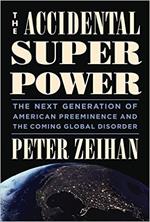
12 Nov Peter Zeihan

Speaker: Peter Zeihan
Geopolitical strategist, Demographer, and Author
Speech Topics Include:
- Seven(teen) Years of Lean: The Future of Global Finance
- Supersize Me: The Future of Global Energy
- The American Age
- What Every Financial Professional Should Know About Geopolitics
- Powers of Yesterday, Powers of Tomorrow
- Amber Waves of (American) Grain: The Future of Global Agriculture
- No Assembly Required: The Future of Global Manufacturing
Speaker Peter Zeihan is a geopolitical strategist who has lived in the world of international affairs throughout his career. He launched his own firm, Zeihan on Geopolitics, in 2012 in order to specialize in customized executive briefings for his clients. In his new life Zeihan applies his 12 years of intelligence experience and a geopolitical perspective to specific the needs of his clients. With a mix of insight and irreverence he helps them see their businesses and industries from a new point of view, so that they can prepare for a now-more-understandable future. Zeihan’s first independent book — The Accidental Superpower — published in November 2014.
Mr. Zeihan is a frequent guest on national and international television news shows on CNN, ABC, Fox News, and also is frequently interviewed for radio programs. Speaker Peter Zeihan has been quoted in major print and online publications including the New York Times, Forbes, the Wall Street Journal, AP, Bloomberg, MarketWatch and many others.
Before becoming a full-time speaker, Zeihan was part of the core team that built Stratfor into a geopolitical consultancy and publishing house. In his variety of roles — for four years serving as the firm’s Vice President of Analysis — he designed products, serviced client needs and managed the firm’s analytical teams across all geographic and topical areas of responsibility.
Zeihan began his career working for the State Department in Australia, later moving to Washington DC to join the Center for Political and Strategic Studies under Susan Eisenhower. In both capacities, he regularly analyzed developments in Asia, Europe and the former Soviet Union while producing briefs and publications.
When speaker Peter Zeihan isn’t speaking to the future of shale energy or Brazilian finance or Russian military strategy or German industry or Indonesian mining or China’s political transition, he is typically working on the draft of his next book, Shale New World.
Seven(teen) Years of Lean: The Future of Global Finance
In the decades since World War II, everything from computerization to securitization to the rise of the developing world has made the financial sector central to modern economic activity. But never forget that modern finance itself is an outgrowth of revenues generated by the global free trade order. Never forget that the past two decades have witnessed the richest and cheapest supplies of capital in history. A political decision made seven decades ago created the trade order. A fleeting demographic moment created the capital richness. Both have nearly run their course. Very soon we will bid finance as we know it goodbye, and the world will be much poorer for it. A few locations, however, will find the wreckage easier to struggle through than others. For those lucky few, the world will be their oyster.
Supersize Me: The Future of Global Energy
The global energy sector is as complicated and opaque as it is omnipresent and essential, and it has adapted to not simply the changes in the global economic system, but the global political system. Countries that were weak to nonexistent in ages past now are major players in global energy markets, both as producers and consumers. The system that has allowed this evolution now is under fire, and soon the stability that has enabled the energy sector to create its global webwork will end. What will follow will be a world both more chaotic and poorer, one in which the process of finding, producing, transporting and refining energy will simply be beyond the military and financial capacity of most players. Only the largest, smartest and richest entities will be able to maintain – much less expand – their networks. Far from its final days, the era of the supermajor has not yet begun.
The American Age
Americans think of themselves as set apart from the rest of the world, and to a certain degree they are correct. But it is not that Americans are ‘better’ or ‘more free’ that makes them different, instead that they enjoy supreme geographic positioning and favorable demography — something that is not currently enjoyed by any other major power. Played as little as twenty years forward, this will result in an American-dominated international system with all of the economic and strategic benefits that such implies. But it is a very different world from the one we now know.
What Every Financial Professional Should Know About Geopolitics
Geopolitics is the study of how place impacts people — whether that impact be cultural, military, economic, political…or financial. Everything from how banks lend to how stocks are traded is heavily colored by where one lives, and understanding the unspoken — and often unacknowledged — rules of the game can prove critical to financial success. Zeihan explains how geography impacts the various regions differently, how this elevates some sectors while enervating others, and what sort of surprises — both good and bad — are about to burst onto the stage.
Powers of Yesterday, Powers of Tomorrow
Americans believe that their greatest days are behind them and that a series of new powers is rising up to displace them. On the contrary, America’s best days — militarily, economically, financially and culturally — are still ahead of them. In fact, many of the states that the Americans feel are up-and-comers — most notably China, Russia and India — are merely experiencing a historical moment in the sun courtesy of factors utterly beyond their control. Most of the powers of tomorrow are countries that the Americans either have very little knowledge of. The major powers of 2030 will not based in Beijing or Moscow, but in Jakarta, Buenos Aires, Warsaw, Istanbul and Mexico City.
Amber Waves of (American) Grain: The Future of Global Agriculture
Modern agricultural patterns are the result of three largely unrelated factors: low-risk global trade, insatiable Asian demand, and unlimited cheap credit. Within the next five years, all three of these trends will not just evaporate, but invert. When that happens, the only thing that will hurt more than the gradual loss of demand will be the sudden collapse of supply. However, none of this impacts the American producer – it therefore will be the United States that will reap the benefits of its productivity and stability for decades to come.
No Assembly Required: The Future of Global Manufacturing
The world of manufacturing is an endlessly specialized venture, with most manufacturers sourcing components from scores of facilities across a dozen or more countries. But what if the ability to sail components from site to site became compromised? What if capital availability proves insufficient to update industrial bases as technology evolves? What if intermediate and end markets become less desirable – or less accessible? All that and more is about to happen, which signals the end of manufacturing as we know it. The successful manufacturers of the future will be those who can command access to raw materials, capital, labor and markets – all in the same location.
 PETER ZEIHAN - About Peter & Keynote Clips- Collaborative Agency Group
PETER ZEIHAN - About Peter & Keynote Clips- Collaborative Agency Group PETER ZEIHAN - The World That You Know- Collaborative Agency Group
PETER ZEIHAN - The World That You Know- Collaborative Agency Group PETER ZEIHAN - Demographics- Collaborative Agency Group
PETER ZEIHAN - Demographics- Collaborative Agency Group PETER ZEIHAN - Russian Grab- Collaborative Agency Group
PETER ZEIHAN - Russian Grab- Collaborative Agency Group PETER ZEIHAN - The End of Canada- Collaborative Agency Group
PETER ZEIHAN - The End of Canada- Collaborative Agency Group PETER ZEIHAN - Understanding Americas Success- Collaborative Agency Group
PETER ZEIHAN - Understanding Americas Success- Collaborative Agency Group



